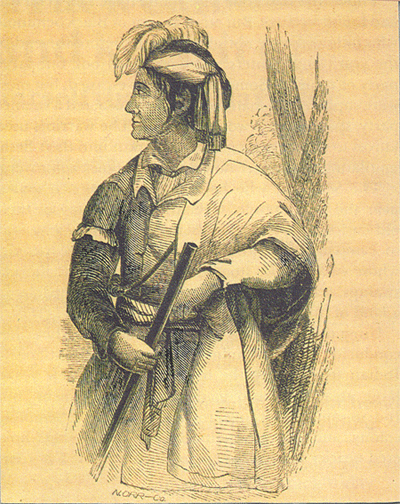
From the September 1852 installment of Scenes Beyond the Western Border:
The example below is from the start of a new chapter in Melville's The Confidence-Man renewing dialogue between, as we eventually learn, "Frank Goodman" and "Charlie Noble." Uh, that would be F. and C. As in the 1852 example above, the C. character is the one now telling the story, the one who speaks of what came before (here, a whole chapter and more) as merely an elaborate "introduction":
For more on the Seminole wars in The Confidence-Man, check out the Melville chapter "Writing and Silence" in Removals by Lucy Maddox.
"Then, of course, we marched back to the river bank; and lay down in our cloaks, supperless. But this is all introduction; I have tired you before the day is begun!"
F. "'No, it is not very late; I was rather amused at your account of those spoiled Seminoles. . . .""F." in the dialogue above stands for Frank, the Captain's imaginary friend. (Altered in the 1857 book version to Friend.) From August 1852 through the end of the series in August 1853, these obviously invented prairie dialogues are typographically represented as conversations between "C." and "F."
The example below is from the start of a new chapter in Melville's The Confidence-Man renewing dialogue between, as we eventually learn, "Frank Goodman" and "Charlie Noble." Uh, that would be F. and C. As in the 1852 example above, the C. character is the one now telling the story, the one who speaks of what came before (here, a whole chapter and more) as merely an elaborate "introduction":
"Coming to mention the man to whose story all thus far said was but the introduction, the judge, who, like you, was a great smoker, would insist upon all the company taking cigars, and then lighting a fresh one himself, rise in his place, and, with the solemnest voice, say— 'Gentlemen, let us smoke to the memory of Colonel John Moredock;'. . . .The reference by Frank #1 to "spoiled Seminoles" I take to be deeply ironic, the flip-side of Melville's featured charity, the "Widow and Orphan Asylum recently founded among the Seminoles."
For more on the Seminole wars in The Confidence-Man, check out the Melville chapter "Writing and Silence" in Removals by Lucy Maddox.
Go for it! (Eternal glory via your note on Vidocq and Melville's Counterpane chapter in Moby-Dick.) Most suggestive parallel, makes me want to read more in Vidocq. Hey there's a weird and vivid dream in Scenes Beyond the Western Border I never could get a handle on. I have to look at that again, too.
ReplyDelete